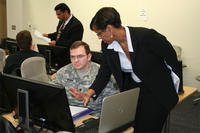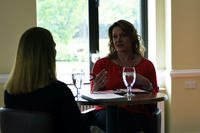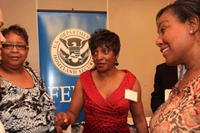WASHINGTON -- Through its investor education foundation, the Financial Industry Regulatory Authority, or FINRA, is helping military spouses become accredited as financial counselors.
The foundation’s “Military Spouse Fellowship Program” has been providing military spouses the means to earn the accredited financial counselor designation since 2006, John Gannon, the foundation’s president, said.
Military spouses who are accredited financial counselors can be a wealth of financial information for servicemembers and military families as the country faces a challenging economy, Gannon noted.
“What we’re trying to achieve with our spouse fellowship program is [to] provide an additional resource for military families to go to get counseling on financial matters,” he said. “A secondary thing is it helps military spouses, who have historically been underemployed, take on skills that may lead to future employment in the financial services area.”
The fellowship program, which the FINRA foundation administers in partnership with the Association for Financial Counseling and Planning Education and the National Military Family Association, is offered at no cost to the participants.
“We cover the costs associated with becoming an accredited financial counselor, and in turn, [we] ask the spouse who receives the fellowship to provide a certain number of hours of financial counseling to other military families,” Gannon said. “To date, participants in the program have logged more than 95,000 hours of service back to the military community. That’s all pro bono.”
The program is competitive; more than 2,000 military spouses applied for 200 openings in 2006. The second year saw only slightly fewer applicants, Gannon said.
The online program is appealing to military spouses because it can be tackled wherever they’re living, as long as they have access to a computer and the Internet, he said. In fact, 33 percent of the 189 spouses who began the program last year were overseas.
While the program is self-paced, it’s designed to be completed in two years. But foundation officials realize that situations can change, Gannon said.
“Because of the combination of the self-paced nature of the course work [and] the need to get a certain number of pro bono hours, it can take a couple of years to complete the program,” Gannon said. “We’ve tried to be lenient with spouses, because we realize that due to changes in their situation, sometimes things come up that make it much more difficult to complete the program.”
FINRA officials try to make it easier by helping fellows find opportunities to fulfill their pro bono requirements. Sometimes those opportunities are with FINRA.
When fellows do complete all the requirements and become accredited financial counselors, they are equipped to help educate servicemembers and their families, Gannon said.
“One of the things that we’ve tried to do to our overall military financial education program is to really provide resources for the military on credit issues, especially now because of the tightening of the markets,” he said. “It’s even more important than it was just a short time ago that people have really good credit scores so that they can get a mortgage to buy a house, or even a car loan.
“[Fellows] can help on that issue by working with military families to understand the importance of good credit and a good credit score,” Gannon added.
They’re also qualified to fill positions in defense federal credit unions, financial aid offices and community centers.
Officials try to maintain service diversity among the fellows, Gannon said -- Army spouses represented 33 percent of all the fellows, the Air Force 23 percent, the Navy 22 percent and the Marine Corps 11 percent -- but also try to give the fellowships to the best-qualified candidates.
The application process for the 2009 Military Spouse Fellowship Program has not yet opened. When the information does become available, it will be posted on the FINRA Investor Education Foundation’s Web site, http://www.saveandinvest.org, Gannon said.
The program is open to spouses of active duty, reserve or retired Army, Navy, Air Force, Marine Corps, Coast Guard, and Army and Air National Guard servicemembers. The spouses of U.S. Public Health Service Commissioned Corps and National Oceanic and Atmospheric Administration professionals also are eligible, Gannon said.






















